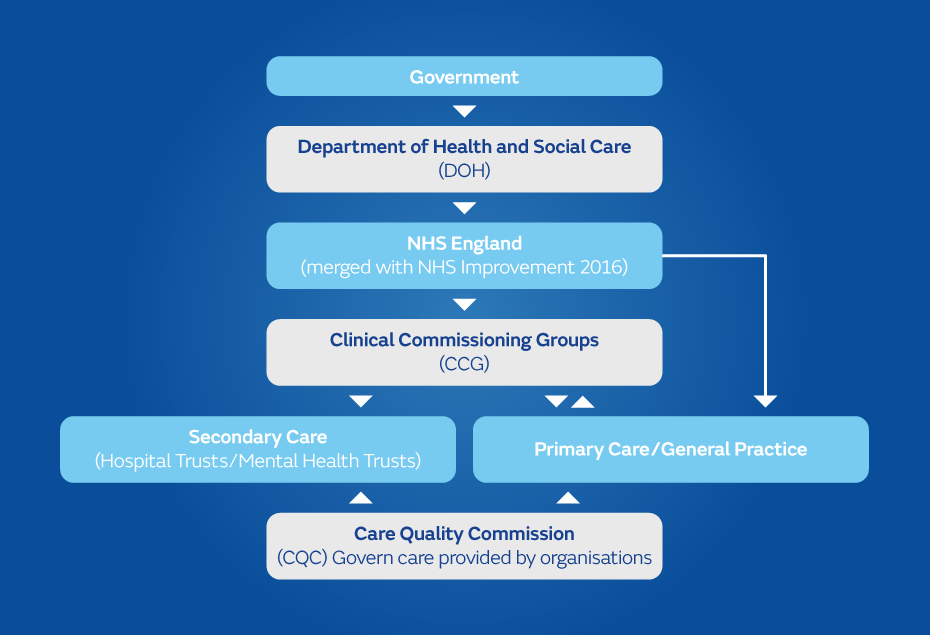The NHS stands for the National Health Service. It refers to the Government-funded medical and health care services that everyone living in the UK can use without being asked to pay the full cost of the service. In the following article, Dr Emma Green of Medical Protection provides an overview of the structure that can appear complex and highlights some of the other organisations involved and acronyms you may come across.
The National Health Service (NHS) was founded in 1948 by the Minister of Health Aneurin Bevan. It was designed as a way of giving free healthcare to people in post-war Britain.
The term NHS applies to state healthcare in England, Scotland and Wales. In Northern Ireland it is known as Health and Social Care (HSC).
The structure can appear quite confusing and is under continual change. Often organisational names may change and organisations may merge. Do not worry as there is a huge support network available to you once you start work and many other doctors will be in the same position. The four different countries which make up the United Kingdom also use slightly different terminology.
This article summarises the NHS structure (in England) as of March 2022 and includes some information about key organisations including those in Wales, Scotland and Northern Ireland.

The Government are responsible for overseeing healthcare and the overall budget for healthcare. The Secretary of State for Health and Social Care is a government position and is responsible for the work of the Department of Health and Social Care. This department is often referred to as DOH. The DOH are responsible for supporting Ministers in healthcare policy decisions and work alongside a number of other key agencies.
NHS England is the organisation responsible for leading the priorities of the NHS. It is responsible for managing the NHS budget and assessing, planning and acquiring the services needed to provide healthcare. This is known as “commissioning”.
NHS England work alongside Clinical Commissioning Groups to obtain the services required in each area. CCGs are groups of GPs who come together in an area to acquire the services they require. NHS England is usually responsible for directly commissioning GP services, although in some areas this may be the role of the CCG.
In England, GP services are usually known as primary care. Some other examples of primary care include dental services and pharmacists.
Clinical Commissioning Groups are responsible for obtaining other elements of care required, including urgent and planned care, such as 111 or elective hospital services.
Any service provided in either primary or secondary care is regulated by the Care Quality Commission (CQC) who ensure that standards are being met. They also monitor facilities such as care homes.
Other organisations and acronyms to be aware of:
British Medical Association (BMA)
This is a trade union who represent doctors and medical students and negotiate and advocate in healthcare matters. They are also responsible for negotiating pay and conditions.
British National Formulary (BNF)
This is a book which provides information about available medicines.
Care Inspectorate Wales (CIW)
CQC equivalent in Wales.
General Medical Council (GMC)
This is the regulatory body for doctors in the United Kingdom and is responsible for the registration of all doctors and ensures their fitness to practise.
Health Boards (Scotland)
Term used for regional organisations delivering NHS services in Wales.
Health Boards (Wales)
Term used for regional organisations delivering NHS services in Wales.
Health Education England (HEE)
Responsible for training and development of the NHS workforce in England. They are due to merge with NHS England in 2022.
Health Improvement Scotland (HIS)
CQC equivalent in Scotland.
Health and Social Care - Northern Ireland (HSC)
Publicly funded health care provision for NI. Equivalent of NHS.
Medical Defence Organisation (MDO)
This is a general term for the organisations which provide medical indemnity for doctors. Indemnity protects doctors in the event of an adverse incident such as a patient complaint, a regulatory matter or other medicolegal issues.
Medicines and Healthcare Regulatory Authority (MHRA)
Department of the DOH that regulates medicines and medical devices.
NHS Resolution (NHSR)
They have four areas of responsibility:
- Responsibility for handling and managing claims brought for compensation relating to NHS care from primary care (since April 2019) and secondary care.
- Support and advice about performers of doctors working in NHS secondary care.
- Primary care appeals relating to contracting of services.
- Safety and learning.
National Institute Clinical Excellence (NICE)
Provide evidence-based recommendations for clinical care.
Local Medical Committee (LMC)
Local representative groups of NHS GPs.
Primary care network (PCN)
A collaboration of care services working together, for example GPs with pharmacists, community services and mental health services.
Parliamentary and Health Service Ombudsman (PHSO)
Responsible for making final decision of complaints that have not been resolved by the NHS in England.
The Regulation and Quality Improvement Authority (RQIA)
CQC equivalent in Northern Ireland.
About the author
Dr Emma Green is a Medicolegal Consultant and has worked at Medical Protection for 6 years, previously working exclusively on medical claims. She has experience in delivering advice on all case types and regularly writes medicolegal articles and provides teaching on a range of subjects. She has worked in the NHS as an emergency medicine clinician up until 2021 and has worked closely with IMGs in the emergency department and when teaching advanced life support. Dr Green is also a GMC associate for the PLAB examination.